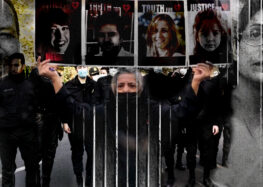Facing 20-Year Prison Sentence for Taking Headscarf Off in Public, Woman Flees Iran

“Due to the Injustices of Iran’s Judicial System I Had to Leave Iran”
Draconian Sentences Demonstrate the Authorities’ Cultural Tyranny
July 10, 2018—Shaparak Shajarizadeh, one of the women who took her headscarf off in public during the ongoing protests against forced hijab that have roiled Iran over the last six months, has been sentenced to two years in prison and an 18-year suspended sentence.
Shajarizadeh relayed the sentence, issued for “not observing Islamic hijab” and “encouraging corruption” by Branch 1089 of Tehran’s Criminal Court under an unnamed judge on her Instagram page on July 8.
The Center for Human Rights in Iran (CHRI) condemns this sentence and rejects the legality and legitimacy of sentencing any individual for peacefully exercising their right to freedom of expression. CHRI calls on the international community to forcefully relay their complete rejection of this sentence.
“The authorities in Iran are demonstrating a cultural tyranny that blatantly violates its international obligations of freedom of expression,” said Hadi Ghaemi, CHRI executive director.
“Any sentence for peaceful protest is a grotesque misuse of power that should be roundly condemned by the international community,” Ghaemi added.
In a Twitter video message posted on the account of Alinejad Masih, the creator of the White Wednesday campaign against forced hijab, Shajarizadeh said that she had left the country, as she felt the authorities were “building a case against her” and that she “didn’t feel safe in Iran any longer.”
Shajarizadeh’s lawyer, the prominent human rights attorney Nasrin Sotoudeh who has herself been imprisoned for representing the protestors against compulsory hijab, has called the ongoing arrests a “manifestation of violence against women.”
Shajarizadeh has been arrested repeatedly—in late February 2018 for removing her headscarf and waving it on a stick in the north Tehran neighborhood of Gheytarieh, and onMay 8 in the city of Kashan, 152 miles south of Tehran, for allegedly removing her hijab.
Shajarizadeh and other women who have taken their head scarves off in public in cities across the country in 2018 have been referred to as the “Girls of Revolution Street” by social media users.
Two women are currently facing prison time for engaging in this peaceful protest. On March 7, sociology student Narges Hosseini, 32, was sentenced to 24 months in prison—21 months suspended for five years—and on March 25, Maryam Shariatmadari, a 32-year-old computer science student in Tehran, was sentenced to one year in prison.
Iranian women have been protesting against the compulsory hijab that was instated in Iran shortly after the country’s 1979 Islamic Revolution for more than three decades in various ways.The protests received international attention in 2018, after 31-year-old mother Vida Movahed stood on a sidewalk utility box on Enghelab (Revolution) St. in Tehran on December 27, 2017, and waved her headscarf like a flag.
All women in Iran are forced to cover the skin on their bodies (excluding the face) and their hair when they are in public. This rule was gradually imposed after the country’s 1979 revolution by then-Supreme Leader Ayatollah Ruhollah Khomeini.
Women who fail to cover themselves according to current standards in public in Iran could be arrested, fined, lashed and imprisoned for committing “haram.”
*This article was revised on July 11, 2018, to reflect that the name of the judge who sentenced Shaparak Shajarizadeh is unknown.






